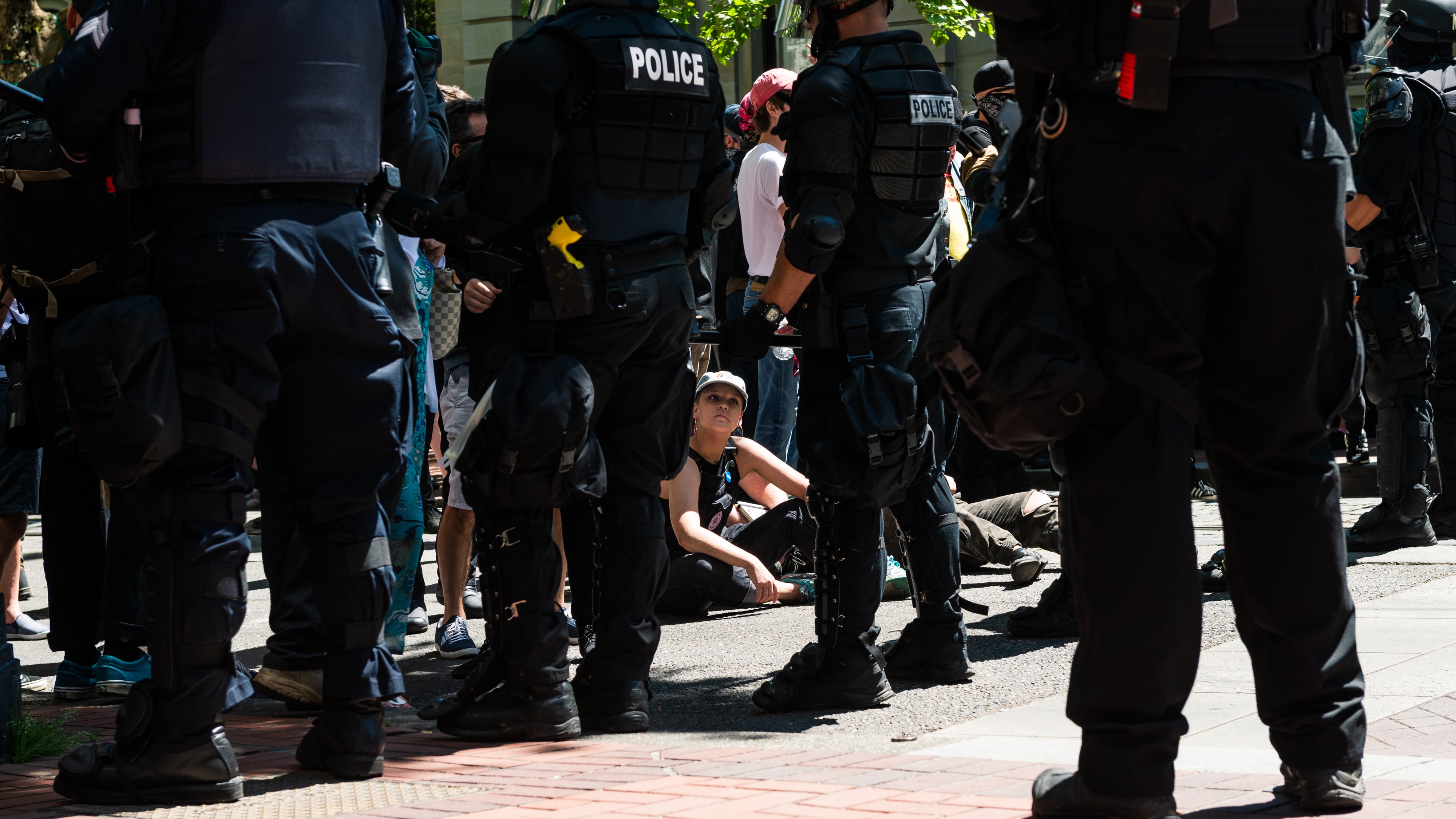A barrage of intense national criticism of how Portland police handled a June 29 protest has renewed a fight between Mayor Ted Wheeler and police union president Daryl Turner.
An assault by antifascist demonstrators on conservative journalist Andy Ngo triggered a storm of partisan outrage, most notably on Fox News, which has long made Wheeler a favorite target. (Donald Trump, Jr., the president's son, chimed in today.) Police fueled the fury by tweeting a rumor that Antifa had stirred fast-drying concrete into milkshakes—a claim that they now concede has no physical evidence.
The most immediate effect of the controversy was to give oxygen to Turner's longstanding gripes about the mayor. His chief complaint: He claimed Wheeler was preventing police from controlling violent extremists who gather in Portland to brawl.
"It's time for our Mayor to do two things," Turner wrote in a Monday open letter to Wheeler. "Tell both ANTIFA and Proud Boys that our City will not accept violence in our City and remove the handcuffs from our officers and let them stop the violence through strong and swift enforcement action. Enough is enough."
Turner also alleged that liberal Portland politicians were afraid to criticize violent leftists. "Where are the voices condemning the lawlessness and violence? If this violence had been directed at Antifa, there would have been an immediate call for an independent, outside investigation," Turner wrote on July 1. "This is a perfect example of Portland politics at work and why our great City is now under fire in the national news."
Wheeler responded to Turner's letter in a Facebook post on July 2.
"As a sworn officer," Wheeler wrote, "Daryl Turner should know the dangers of spreading misinformation. These unsubstantiated false narratives are a disservice to the Portland Police Bureau and the public at large." He continued: "It spins up extremists and oversimplifies a very complex, fraught political dynamic in our city. Ginning up anger without offering any real solutions impedes progress."
Today, the mayor took to social media again to explicitly deny that he had ordered officers to take a hands-off approach to protesters last weekend.
"Since this continues to be widely circulated and believed, let's break this down factually," Wheeler wrote on Twitter. "Concerning the recent protests: There were no orders to police to stand-down. No 'handcuffs' placed on them."
This afternoon, Police Chief Danielle Outlaw opened a press conference by confirming that Wheeler had issued no such order for the June 30 protests.
"First and foremost," she said, "I want to use this opportunity to let everyone know: The mayor never gave us direction to stand down on Saturday, ever."
Related: Police Chief Danielle Outlaw suggests banning masks at protests.
The attack on Ngo—and the resulting arguments—come after more than two years of regularly scheduled street brawls between right-wing marchers and their antifascist foes. Police have rarely made arrests at these fights, and have been repeatedly criticized by both political factions for their tactics.
Likewise, this isn't Wheeler and Turner's first standoff. Here's a timeline of Turner's criticism, and Wheeler's defense, of his handling of police policies.
May 2017: The city posts a job description as part of its hunt for a new police chief and adds in a blurb acknowledging Portland's "history of legally sanctioned systemic racism with legally enforced exclusionary practices."
Turner, who is African-American, said in a statement that he took issue with the "verbiage" and added that the post had a "clear implication" that the bureau supported "a racist culture in the City."
Wheeler defended the posting and said, "I have never called into question the values and beliefs of our rank and file police officers."
July 2018: Turner issues a statement blaming Wheeler for letting the city devolve into a "cesspool." Turner said that "livability that once made Portland a unique and vibrant city is now replaced with human feces in businesses doorways, in our parks, and on our streets."
Turner's statement came shortly after Wheeler expressed his support for an internal investigation to be done on the Portland Police Bureau after The Oregonian reported that half of the arrests made in 2017 were of people living on the streets.
Turner wrote that Wheeler was using the police bureau as a scapegoat for his own failures. "True to form, instead of standing up and leading, Mayor Wheeler has reverted to the, 'Is there some sort of profiling or implicit bias by the cops' rhetoric to smokescreen his own failed policies."
August 2018: Turner attacks again, this time criticizing Wheeler for his instruction that police not intervene during an occupation of U.S. Immigration and Customs Enforcement headquarters. Turner said Wheeler had "failed miserably." Turner said in the statement that Wheeler needed to "put his personal political beliefs aside and ensure public safety is his top priority."
October 2018: A downtown protest devolves into violence between Antifa and right-wing groups in Portland's streets, and Turner strikes again. He calls out City Council for not stopping violence in the streets: "The culture of enablement, restriction of enforcement, criticism of police when we act, and criticism of police when we don't act, along with an over-emphasis on de-escalation and disengagement has led us to our present, unacceptable situation," Turner said in a statement.
Several days after the brawl, Wheeler announced he would be proposing an emergency ordinance that would put restrictions on where and when groups could protest. Civil-liberties advocates took issue with the proposal, and it was rejected by City Council.
Today, Outlaw suggested City Council reconsider. She said the debate over police tactics was a distraction from the central problem: extremists entering the city intending to hurt each other.
"I don't know what they were protesting against," Outlaw said. "Because they came to fight."

